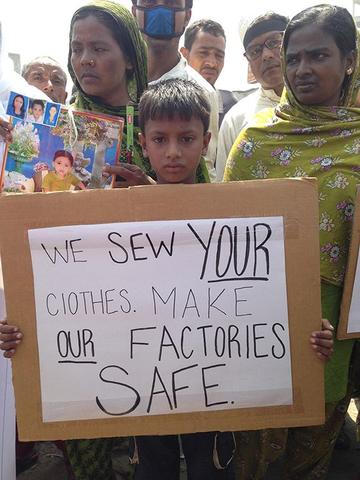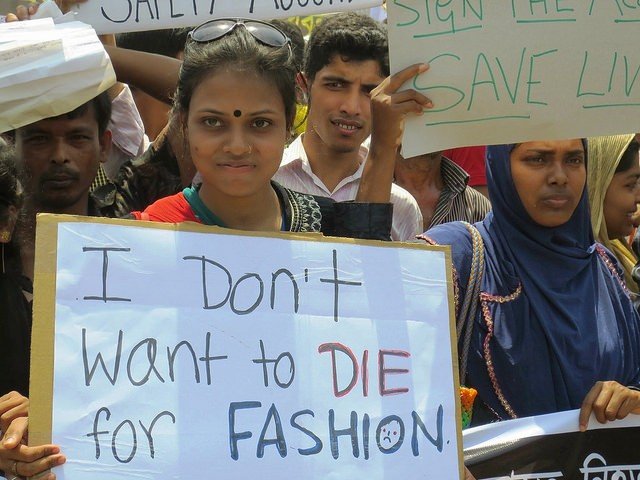Breaking the Chains of the Fashion Industry: How fashion is exploiting our people and the Earth
Behind the oil industry, the fashion industry is the world's second largest polluter. The sad reality is that there is more water consumption, ground water contamination, and toxic waste dumping that can be associated with this industry than any other. It is estimated that a fifth of all industrial water pollution is caused by the fashion industry.†† We cannot afford to continue to exploit the earth any longer. There's no denying that there is a huge problem with the fashion industry and the way people view it.
“Fast fashion and cheap fashion has completely rewritten the rules of how we think about and consume clothes.”
Workers in garment factories are often paid less than $3 per day and are being exposed to hazardous chemicals and working conditions constantly. Unless you are wearing organic fabric, these same hazardous chemicals are on the clothing you are wearing right now, and being absorbed by your skin into your bloodstream.
 §
§
I believe that by opening everyone's eyes to what is behind the garments we wear on a daily basis and the damage we are doing to this earth, we can begin to fix this problem. We need clarity and translucence when it comes to the background of the clothing we put on our bodies. The people working in these factories, many of which are women and even children, need justice. You are supporting a form of modern day slavery when you buy cheap clothing. Let us break free of this vicious cycle of over-consumption and under-compensation.
 ||
||
Garment factory workers protesting on the first anniversary of the Rana Plaza collapse that occurred in April 2013, which killed more than 1000 individuals who were working in the factory.
These worker's basic human rights are being violated & manufacturers turn a blind eye to these things in order to keep the western world stocked with seasonal trends that are sold for very cheap and disposed of very quickly.
The number of suicides of garment factory workers is staggering. It was reported on the last day of 2010 that textile workers and their families in the Indian city of Tiruppur were committing suicide at the rate of 40 to 50 individuals per month.* "The country has seen over a quarter of a million farmers’ suicides between 1995 and 2010 - the worst-ever recorded wave of suicides of this kind in human history." †
Back in the 60's, America was producing 95 % of our own clothing; that number has dropped to just 2% ~ :( The amount of textile waste alone that we throw away each year as a nation is embarrassing to say the least. Only one out every 10 garments of clothing that gets donated is actually sold - the rest ends up dumped in developing countries, landfills, or incinerators.¶ There are so many reasons why we should do more up-cycling with our clothing instead of just throwing it "away", and this is a huge part of it.
We absorb all sorts of environmental toxins through our pores. It is important to take care of your skin because after all, it is your largest organ.
For top yield, fertilizers are applied to cotton. Instead of using pest hunting insects like on organic cotton farms, pesticides are used in regular cotton fields. When you wear organic cotton or hemp, you are avoiding exposure to the harmful pesticides and chemicals that are found in typical cottons, dyes and synthetic fabrics. The synthetic fibers alone undergo several chemical processes to bleach and soften the material, which prove harmful to the body and environment.
There's a slew of chemicals that are commonly used to treat textiles, including formaldehyde, as a way to prevent mildew and wrinkles. Clearly the better option would be hemp, as it is naturally resistant to mildew, mold, UV light and retains it's shape better than any other natural fiber...
Would you rather be wearing clothing made with loving intention, with our bodies and mama earth in mind, or garments designed to be disposable and cheap? Think about it - the fast fashion industry is on a dark path and has been for decades. We must never forget that our money is our vote. If we continue to pour money into this corporate scheme, we are voting to keep these companies alive and in control of hurting us and the Earth.
"The [fast fashion industry] shift is moving ruthlessly towards a way of producing which only really looks after big
business interest." --The True Cost; a documentary film
All we can control is ourselves, so take a step in the right direction by choosing to consume less and purchase up-cycled or organic textiles. At this point in time is it essential to not be apart of the waste created by fast fashion.
I share this message in hopes of making a positive change in favor of supporting and creating environmentally friendly, organic handmade clothing. We need to be buying, and making, if you are so inclined, timeless pieces that are built to last instead of following seasonal trends.
“As we get sort of closer and closer to species degradation, to trashing our last remaining pristine wilderness, we seem hell-bent on producing more and more disposable stuff. It makes no sense. Fashion should never, and can never, be thought of as a disposable product.” -Lucy Siegle
Lucy Siegle produced the documentary The True Cost, which I would highly recommend checking out if this topic strikes a chord with you (as it should). It is definitely an eye opener into what's behind the clothing many of us are wearing on the daily. I have included the trailer below, and you can also find this documentary in it's entirety online on Putlocker for free, on Netflix, or if you would like to support the producers, you can purchase the documentary here: https://truecostmovie.com/
A big thank you to @elamental for his help on this <3
sources:
- (www.wsws.org/en/articles/2010/12/indi-d31.html).
† (www.thehindu.com/opinion/columns/sainath/In-16-years-farm-suicides-cross-a-quarter-million/article12892373.ece).
§ (www.trustedclothes.com).
|| (www.eco-business.com/news/bangladesh-garment-factory-blast-raises-fresh-concerns-over-workers-safety/).
¶ (www.damarrivillo.com/category/sustainable-fashion/).
~ (ww2.kqed.org/lowdown/2013/05/24/madeinamerica/).
††(www.theguardian.com/sustainable-business/water-scarcity-fashion-industry)
It is so important for people to understand the points that are made here. Most people don't realize that the fashion industry is harmful in any way, and just unconsciously donate cloths to Good will thinking they are helping a good cause, when in reality usually at least a portion of what is donated winds up getting dumped in a 3rd world country, which is really contributing to the silver medal winner of pollution. Think about that next time you donate you clothing or buy a garment you only intend on wearing for less than 3 years. Great job, I will do everything in my power to continue to spread the word about this.
I have also seen the documentary, The True Cost. It is very comprehensive and a much watch if you intend to support this cause as we do. Blessings.
Congratulations @hempress! You have completed some achievement on Steemit and have been rewarded with new badge(s) :
Click on any badge to view your own Board of Honor on SteemitBoard.
To support your work, I also upvoted your post!
For more information about SteemitBoard, click here
If you no longer want to receive notifications, reply to this comment with the word
STOPGonna watch the movie tonight. thanks for sharing! It's so important to educate the masses about that. I'm for sustainable consumption especially in a fashion industry.
Good for you - I really couldn't recommend it more. No other documentary has had a greater impact on me than this one did. Thank you for reading and I hope you are as touched by it as I was.
Great article, @hempress! When I first discovereed the health dangers of plastic (not to mention the environmental) I immediately donated of all our clothes made with polyester, rayon, and other synthetic fabrics. We are so much happier having more space, but the house looks nicer not having so much plastic crap! I love using glass jars and wood or bamboo - it just looks more appealing to me. That being said, I still use some plastic things that don't touch food, because throwing it away seemed wasteful.
Sewing clothes, great.